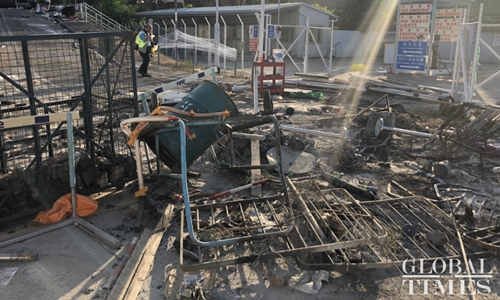
Rioters leave bricks on the Chinese University of Hong Kong (CUHK) campus after retreating on Saturday. They spray slogans on the wall saying "CUHK is fallen." Photo: Wang Wenwen/GT
For parents from the Chinese mainland, especially Shenzhen, South China's Guangdong Province, giving birth to children in Hong Kong to give them education opportunities there used to be a trend.
But in face of the five-month-long social unrest sparked by an already withdrawn extradition bill, Hong Kong's academic opportunities are dwindling as city's academic environment becomes less safe. Some non-Hong Kong resident parents are starting to regret their decisions. Many of them are now considering giving up their children's permanent Hong Kong resident status. For them, sending their children back to the mainland for education is a better choice.
Broken dreams
For non-Hong Kong resident parents and Hong Kong drifters, people from the mainland who try to settle down in the city, they used to view Hong Kong as a safe home. Education in Hong Kong was also attractive for them, because the city has an international education system and some worldwide renowned universities.
The trend of mainland parents giving birth to children in Hong Kong can be traced back to 2001. However, according to the "zero quota" policy, all public hospitals in Hong Kong stopped accepting any bookings by non-local pregnant women for delivery in Hong Kong since January 1, 2013. Data from the Legislative Council in 2013 shows that 291,522 mainland pregnant women successfully delivered babies in Hong Kong in those 11 years it was legally allowed.
However, their dreams were broken by black-clad rioters whom have turned Hong Kong universities into war zones reminiscent of the conflict in Syria, according to a previous report by the Global Times.
Rioters threw Molotov cocktails at a school bus on November 11, targeting innocent school children and shocking the city. A day after, rioters continuously threw Molotov cocktails and set fires at the campus of the Chinese University of Hong Kong, and many other universities have been seriously damaged.
Doris and her husband came from the mainland. They have lived in Hong Kong for years and they have a 5-year-old son. She told the Global Times she had thought of moving the family to the mainland even before the current social unrest occurred, because her husband's business is based in the mainland, but now they have decided to speed up the process.
Many mainland teachers and students have hurriedly fled to Shenzhen and Guangzhou, South China's Guangdong Province, running from fire, bows, arrows and Molotov cocktails at their once tranquil and peaceful schools. All Hong Kong schools have been suspended for days.
"Violence may stop soon, but social division remains wide. We had thought that as long as the city is safe, we can stay, but it is not safe anymore, especially for Putonghua-speaking families like us," said Doris, who has taken her son to Shanghai after last week's chaos in Hong Kong.
Returning to the mainland
Since the political unrest broke out in Hong Kong, many primary schools and middle schools in Shenzhen have reportedly received inquiries from Hong Kong drifters and non-Hong Kong resident parents, asking whether it is possible to send their children to Shenzhen. Many parents are even considering buying an apartment in Shenzhen.
In contrast with the chaos in Hong Kong, the mainland has been enjoying faster development and more employment opportunities. The Guangdong-Hong Kong-Macao Greater Bay Area and the plan of building Shenzhen into a pilot demonstration area for socialism with Chinese characteristics are both attractive for these parents.
Sending children back to the mainland can still be a tough choice. These parents have to face difficulties such as cultural and educational gaps between the mainland and Hong Kong, the high costs of international education (if they do not want to give up their children's permanent Hong Kong resident status) and the long commute.
Doris said she has been looking for an international school in Shanghai. The tuition fees in Shanghai are more expensive than those in Hong Kong, but the campuses are larger.
Most private and international schools in the major cities of the mainland require more than 10,000 yuan ($1,427) a month and many of them do not provide accommodation for the students, making housing a problem as well.
Doris noted that some Hong Kong parents who migrated to countries like Australia and the UK after 1997, but came back to Hong Kong later, are considering leaving again to go abroad.
Many parents from the mainland are thinking of moving back to the mainland, but several factors hinder them from taking action.
"Family background matters a lot. If they have business in the mainland, they can leave as soon as they want. But if they hold senior positions in the financial sector or are lawyers, it is hard for them to find a job in the mainland or get one as highly paid as in Hong Kong," Doris told the Global Times.


